10 Underwhelming And Insufferable Books To Avoid
Apparently, people like it when I bash books. Well, here’s another list of books to toss out the window. You’re welcome.

If you want to read my other list of books that suck, you can: here. Also, if I attacked one of your beloved, most cherished books, just know that you are not alone—others have similarly witnessed their favourite books publicly shamed and ripped to shreds (except for a couple of incidents, maybe) by me. I look forward to hearing what you all have to say in the comments! Happy reading!
Also, I’m curious to know: what are some of your favourite books? And are there any books that you think are overhyped/underwhelming? I genuinely look forward to reading your answers, so if you’re reading (first of all — thank you!) and second, I eagerly await your answers!
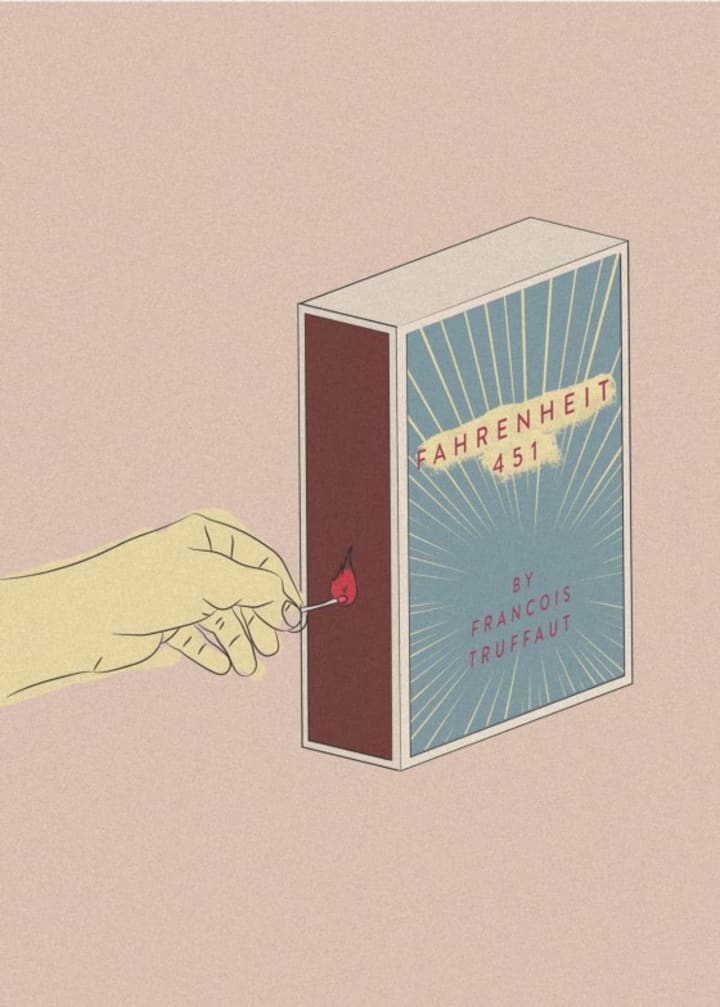
1. Fahrenheit 451 by Ray Bradbury (1953)
Here’s a neat factoid about Ray Bradbury’s Fahrenheit 451: apparently, it only took him 9 days to write the completed manuscript for the novel. Guess what—it reads like it too! Perhaps one of the most glibly written ‘classics’ of time (first of all—why tf is Fahrenheit 451 a classic?!?) I truly cannot wrap my mind around how this book came to be revered or what about it makes it worthy of any of our collective time. My experience reading this book was not good. To me (again, it’s just my opinion) but this book reads like the most basic bitch dystopia ever. It’s hardly a dystopia. The government burns books, and he’s one of the firefighters that burns them. That’s it. That’s the story. I just saved you a bunch of hours.
They call the firefighters (or fire-starters) something else in the book; I forget because I can’t remember a thing about it. No clue why I attempted to remember now. I Eternal Sunshine’d this reading experience from my memory, and burned my copy once I was finished to stand in solidarity with the events taking place within the novel. And to get rid of its existence in my life. It was therapeutic.
Rating: 4/10
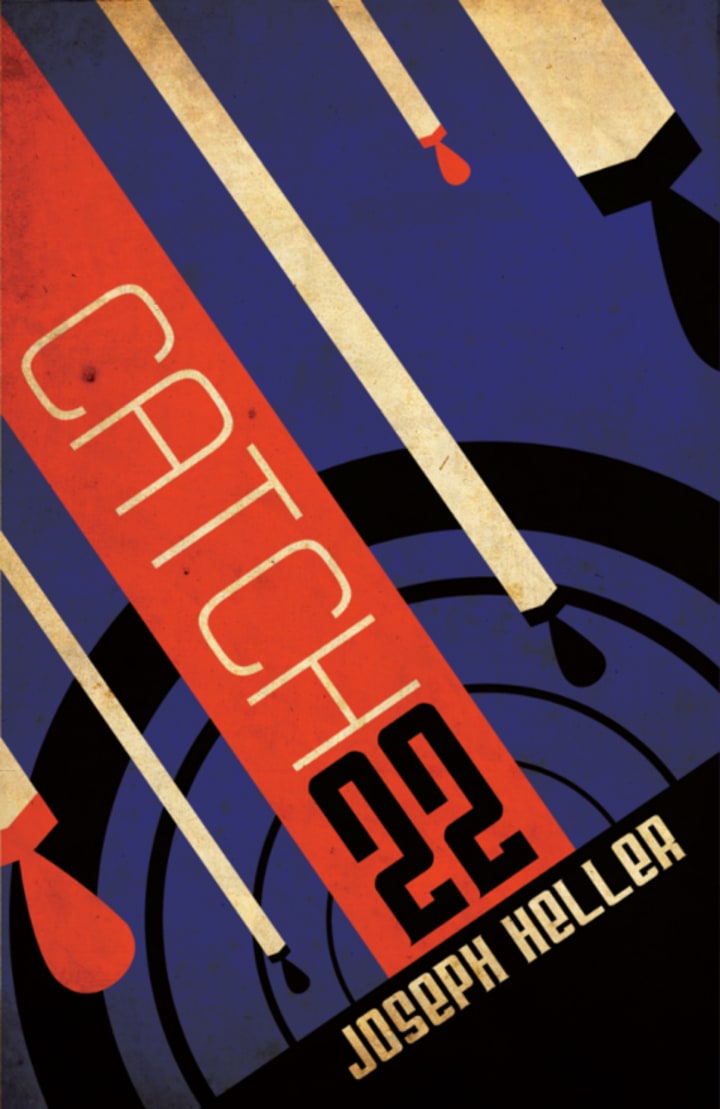
2. Catch 22 by Joseph Heller (1961)
The real catch about Catch-22 is that it’ll take about twenty-two years to finish the thing. They don’t tell you this when purchasing a copy, but I’m letting you know now. I might be exaggerating by two decades, but this book took me two years (on/off) to read.
I have a true love/hate situationship with Catch-22. On the one hand, it’s smart, satiric and jarringly clever at points. Then there’s the other hand, and this hand is the actual reading experience of Catch-22, which at times was unbearable. I trudged along, each page seeming like a variant of the last, for nearly 400 pages. Is that the point? Maybe it’s meta-commentary on life’s absurdity and total meaninglessness? This book might be literary genius incarnate, but it didn’t work for me. It meandered, and I wanted to be done with it early on.
Catch 22 takes place during WWII and follows the American combat pilot Yossarian. The catch of Catch 22 is that you’re damned if you do, damned if you don’t. The writing is special, so here’s the famous excerpt—
There was only one catch and that was Catch-22, which specified that a concern for one’s own safety in the face of dangers that were real and immediate was the process of a rational mind. Orr was crazy and could be grounded. All he had to do was ask; and as soon as he did, he would no longer be crazy and would have to fly more missions.— Catch 22 by Joseph Heller.
Just like my sagacious hero #BoBurnham once said,
“I don’t go to the gym because I’m self-conscious about my body, but I’m self-conscious about my body because I don’t go to the gym. Irony can be so painful. That’s a Catch-22.” — “Kanye Rant” from Make Happy, Bo Burnham, 2016.
Correct. That's a Catch-22. I can see why the novel is a classic and even how others would enjoy it. All I can say is that I don’t personally like being knocked over the head with the same joke for 400-pages. I don’t think this book is underwhelming; I do, however, think it’s overhyped, and personally was not my kind of book.
Rating: 6.5/10
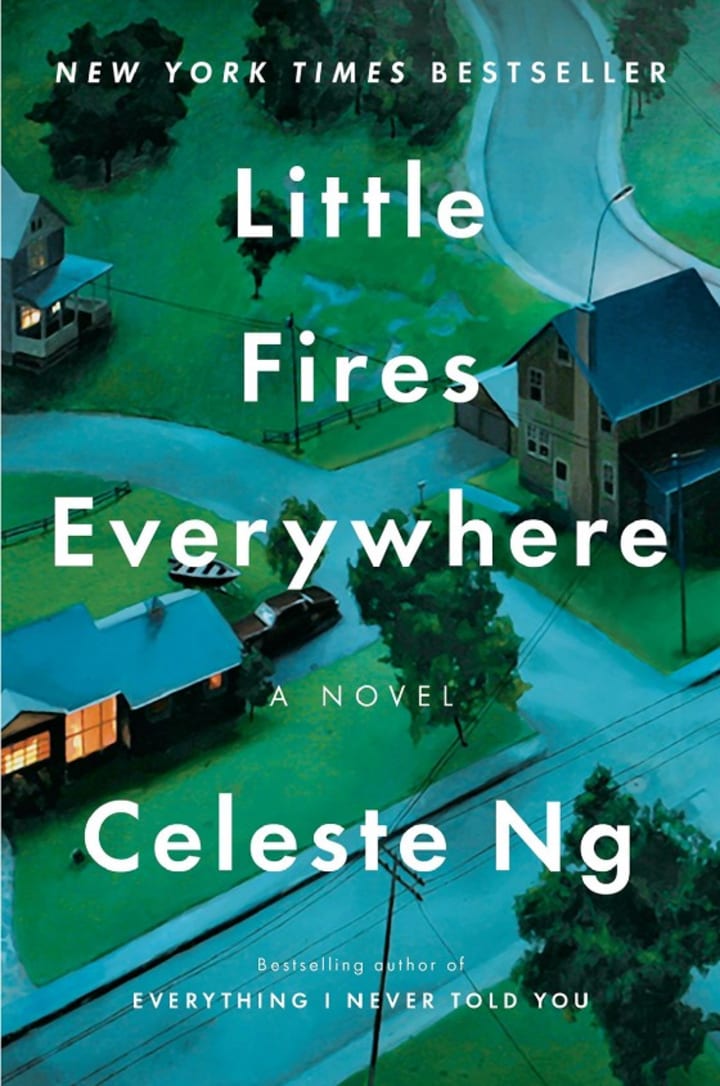
3. Little Fires Everywhere by Celeste Ng (2017)
Little Fires Everywhere is a special disappointment for me because I really enjoyed Ng’s debut novel, Everything I Never Told You. (side note: I’d totally recommend that book if you haven’t read it!)
The publishing industry went bananas over getting Little Fires advertised — we saw it, or at least I did, like — Everywhere. Was this a Reese’s Pieces bookclub decision? Or do I just think every subpar overhyped women’s fic-lit is a Reese book club book of the month? Also, I’ll be honest: I DNF’d this one (aka did not finish.) I felt viscerally while I was reading it that a) it was boring and b) it wasn’t going to be worth it in the end. Reading takes time, so if I’m not feeling a book these days, I’m trying to ease up on myself by giving myself the freedom to abandon it. What’s everyone else’s take on that? Do you suffer through books just to finish them? Oftentimes, I do.
Oh, the plot, I almost forgot, it’s about some people living in a residential suburb in Ohio. There’s a mother-daughter relationship that’s strained… I think, and there are other people too. There may be little fires everywhere too.
Rating: dnf i.e., inconclusive.
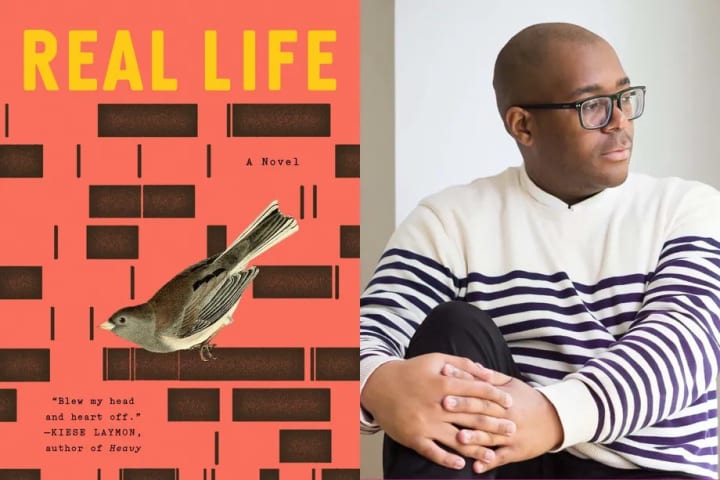
4. Real Life by Brandon Taylor (2020)
If you want to experience the niche brand of pretentiousness that is MFA graduate school fiction writing, look no further than Real Life by Brandon Taylor. This way too long and waaaay too wordy novel follows Wallace. Wallace is an African American homosexual student about to start his Ph.D. at a university in the southern United States. What sounds like an intriguing and campus-ey book (totally my vibe) ends up being the opposite, and this novel was a pill to get through.
In the case of Real Life, it is very hard to like Wallace because he is truly an annoying person. He’s a complainer; he’s whiny and emotionally ambiguous. He expects people to intuitively know how he feels, despite being emotionally inarticulate and, at times, vacant. Each event or interaction in the book felt blown out of proportion; everything felt manipulated to be significant when what was occurring was ordinary. This book felt forced and unnatural to me in various ways. The writing is excessive and elaborate, and the book as a whole takes itself so seriously that it makes you not want to.
Not sure if anyone reading is familiar with the BookTube realm of YouTube, but Real Life was a popular and buzzy book when it came out in 2020. Real Life is a book that I thought I’d love! Unfortunately, this turned out not to be the case, and in fact, this book embodies many of my biggest pet peeves in literary fiction. When I stop to think about it, that’s a pretty extraordinary feat in and of itself.
Rating: 4/10

5. Daisy Jones & The Six by Taylor Jenkins Reid (2019)
I can already feel the hate emanating from your collective pupils through my screen. It’s another Reese’s Pieces book club pick (can confirm it says Reese’s on the cover, and does that ever check out, people!) Let me be clear: I do not hate this book, but it’s wildly overhyped (given what it is, which is not much.)
Daisy Jones & The Six is loosely based on the band Fleetwood Mac, and the relationship between the leads Stevie Nix and Lindsay Buckingham. If Jenkins Reid has not explicitly stated that, it remains obvious nevertheless. It chronicles the rise and fall of the fictional band ‘The Six’, and focuses on Daisy: a young, gifted and beautiful singer that joins the band’s ensemble, and develops a romantic relationship, or perhaps a lover’s tryst with the lead, Billy Dunne.
Daisy Jones & The Six is …fine? It’s entertaining and easy to read. But let me tell you — I cringed — oh, did I cringe. This book is like like a groupie’s take on the inner workings and intimate relationships of the band members. Like, from the outside perspective, glamourized and totally off-base (does that make any sense?) I didn’t find it believable in the slightest, and the story feels commercial. When books are overly twee or saccharine (there’s an SAT word for you!) I’m usually left wanting. I’d say underwhelming, or maybe a better word to describe this book would be ‘unremarkable.’ I can see how it would check off many boxes when it comes to reading satisfaction level, but mine were left unchecked.
Rating: 6/10
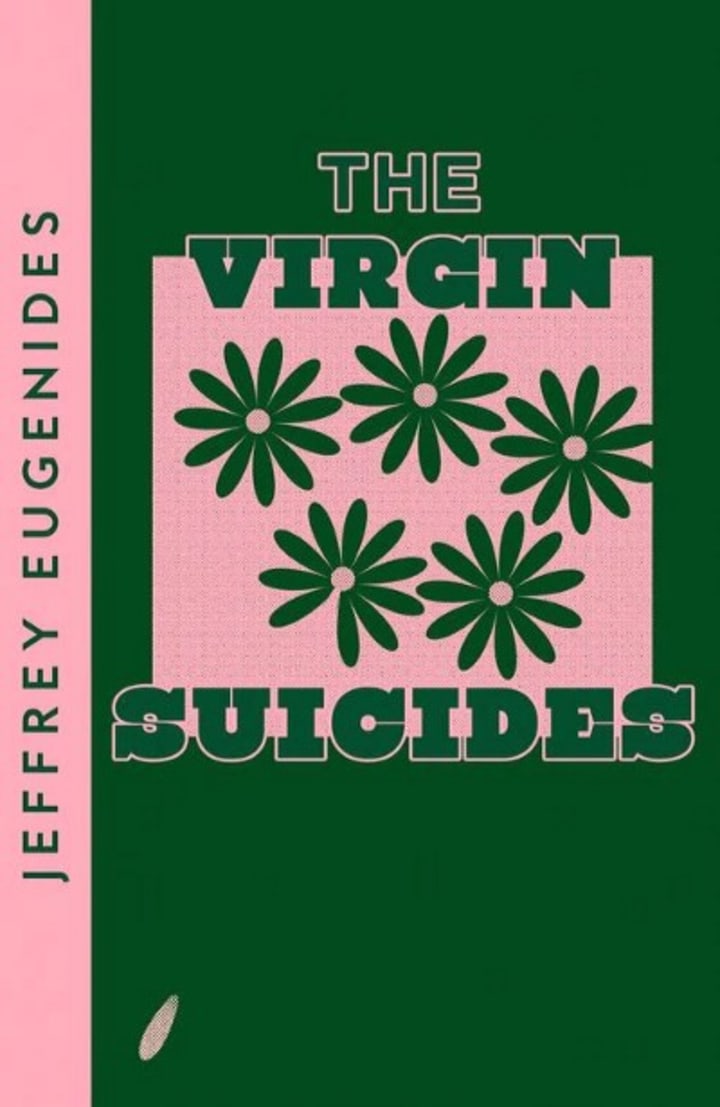
6. The Virgin Suicides by Jeffrey Eugenides (1993)
The Virgin Suicides by Jeffrey Eugenides—can I file a complaint somewhere to be reimbursed for the time I spent reading this trash? The story follows the ill-fated Lisbon sisters that all commit suicide (this is revealed at the beginning, not a spoiler alert). The book traces the before-math (opposite of aftermath, made it up) and events leading up to the suicides in an attempt to understand why they took place.
Strangely, the story isn’t told from the perspectives of the girls themselves. Eugenides has the narrators be a group of boys in the neighbourhood that observe the sisters at a distance. These are teenage boys: they’re sexually attracted to and fetishize the sisters throughout the novel. In turn, little do we learn about what goes on for the sisters themselves (as we don’t hear from them.) The Virgin Suicides is clickbait turned fiction. The title sells the book, not the contents within the pages. This book doesn’t do anything, it’s just a group of boys fantasizing about teenage girls, and it’s boring and dumb. Would not recommend it.
Rating: 4/10
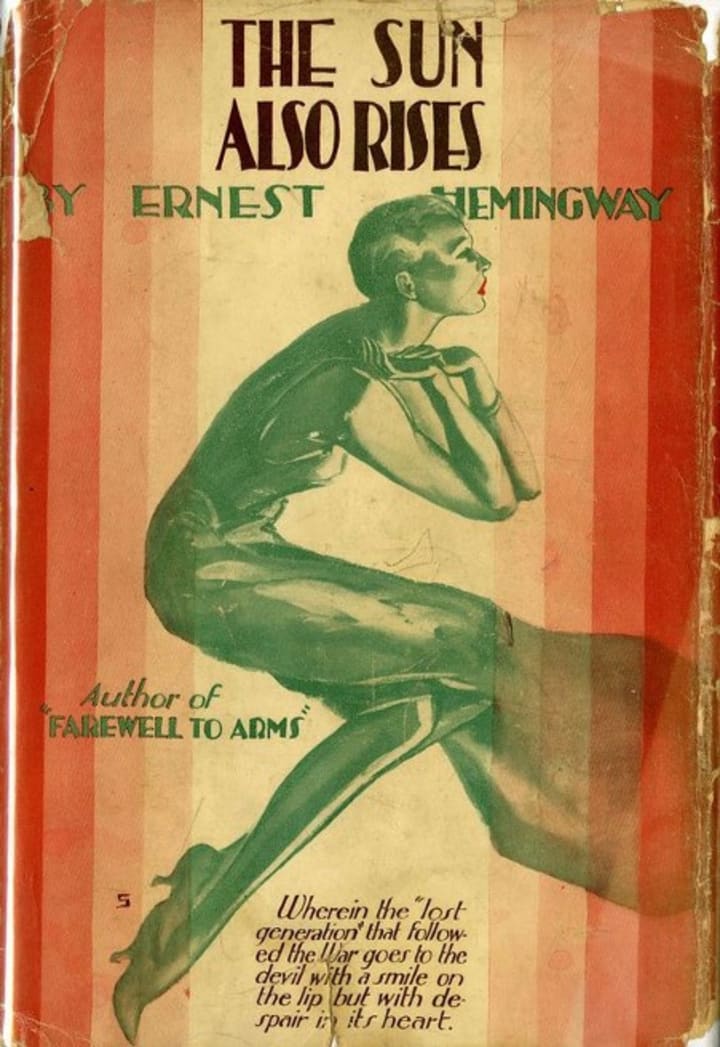
7. The Sun Also Rises by Ernest Hemingway (1926)
The Sun Also Rises by Ernest Hemingway. The sun indeed rises, but this book made me question whether I wanted it to. This book, what a struggle to capture the intensity of my frustration: I hate this book to an unhealthy degree. The Sun Also Rises deprived me of my joy for reading while I was reading it. I only finished it because things got personal and I wouldn’t let it get the better of me. The Lost Generation, The Beat Generation are my personal Not For Me Generations.
The best way for me to compare this book is that it’s On The Road but takes place in Europe post WWI. From my last post, seems like a lot of you were on the same page with me re: On The Road. Appreciate you all for hearing me — I feel understood.
In earnest, I have enjoyed Hemingway in the past. The Old Man and The Sea, I’m happy to agree with its place as a cemented classic (novella?) I’ve read short stories by Hemingway (“A Clean, Well-Lighted Place”; isn’t that the loveliest short story title, don’t ya think?) The Sun Also Rises is boring, it is indulgent, it follows a group of people that are morally depraved and mind-numbingly inane. No doubt, they are the Lost Generation, but please, allow them to lose themselves on their own times without costing me mine. Next.
Rating: 4/10
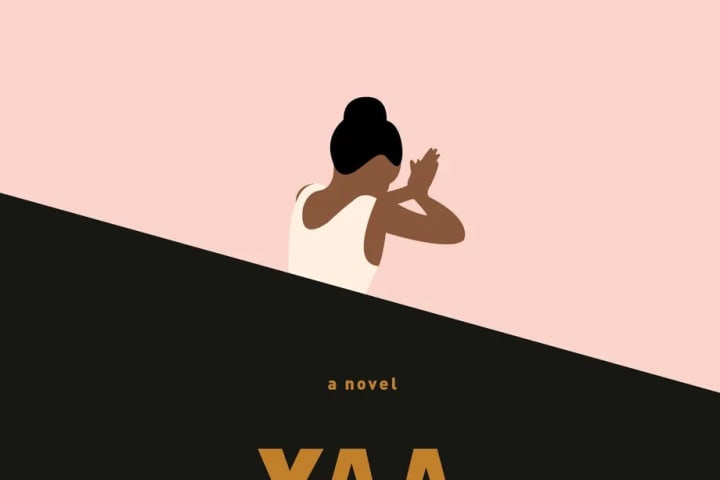
8. Transcendent Kingdom by Yaa Gyasi (2020)
Transcendent Kingdom by Yaa Gyasi is a story about a young academic American Ghanian woman named Gifty. Gifty is getting her Ph.D. in biochemistry, and she’s researching how the brain’s reward system works by conducting experiments on mice. We learn early on that Gifty had a turbulent upbringing and home life: her mother faces mental health problems and has depressive episodes; her father abandoned them, and her brother is an addict.
Yaa Gyasi, I am so sorry. You don’t know me, and there’s no way you’re reading this, but I’m sorry even still. I gushed over Gyasi’s debut novel Homegoing. I read it around when it was released in 2016. Homegoing was an instant bestseller, a topper of charts for a time, and a compulsively readable book. Seriously, I remember starting it on New Year’s eve (yes, I rung in 2017 chillin’ and readin’ in bed, what of it?) I’m pretty sure I finished it on New Year’s day.
Homegoing is an expansive, sweeping intergenerational story that immerses you from the get-go. It follows the lineage of two Ghanian sisters — one who was forced into slavery and shipped to America to be sold in the slave trade (I feel sick typing that, but it is history.) The other sister stays in Ghana. The chapters flip between the perspectives of both sisters, and each chapter moves in time to the next generation. Okay, I loved Homegoing, and that’s the point: even as I sit here to talk about Transcendent Kingdom, I got tied up talking about Homegoing. And that is because Transcendent Kingdom was lacklustre to me. It was an alright book, but it underwhelmed me. It may well be that my expectations had been set so high with Homegoing; and that I’m being uncharitable. But I did read the whole novel (Transcendent Kingdom), and it didn’t do much for me. It was fine. I’ll still read whatever Gyasi comes out with next, but yeah, read Homegoing!!
Rating: 6.5/10
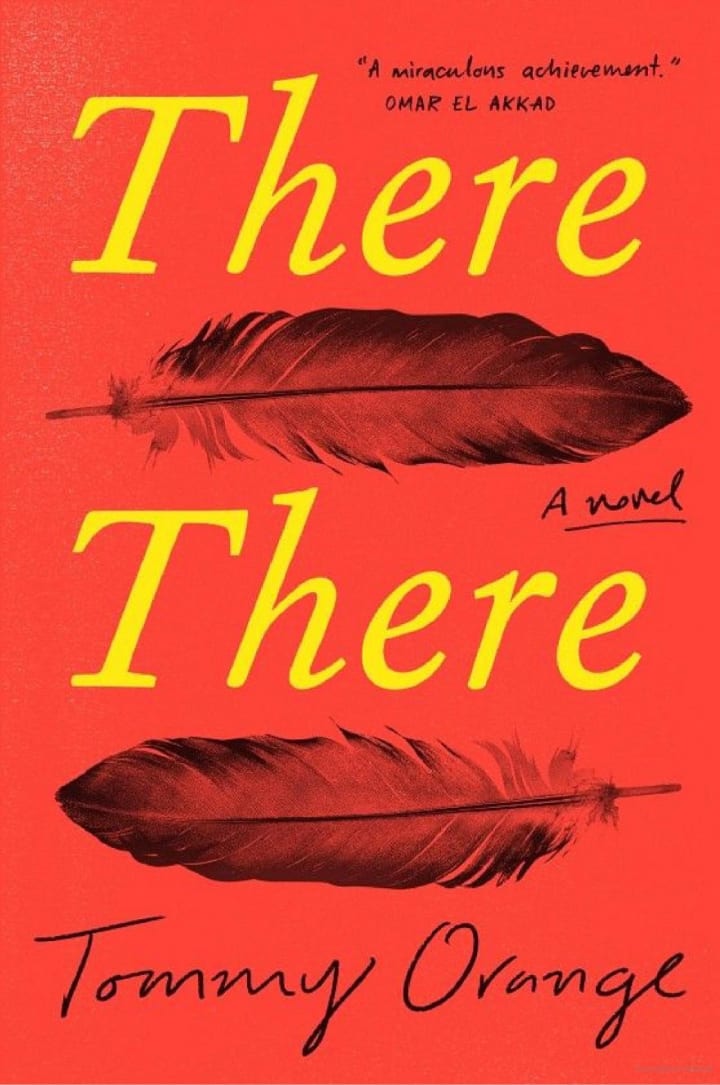
9. There There by Tommy Orange (2018)
Tommy Orange’s debut novel There There follows a cast of Native Americans living in urban Oakland, California. The characters’ lives are all loosely intertwined, though there are too many to remember and distinguish between. That’s the problem with this book, it’s not bad, but it feels like a rough draft and surface level. I remember the character’s repeating the same things, which added to the blurriness and difficulty of setting them apart in my mind. There isn’t a strong plot either, so the entire reading experience along with my memory of the book, is fuzzy.
I was really hoping to like this one! The premise attracted me: how it looks at Indigenous people living today in urban settings. There was hype around There There when it was released, so I did have some expectations going into it. Sadly, this book fell flat for me; it was an underwhelming and forgettable read. I hardly have a comment to say about it, which is rare for me. I’d skip this one.
If you do want to read outstanding fiction by Indigenous authors, I highly recommend Indian Horse by Richard Wagamese if you haven’t read it. It’s a small book that packs a serious punch and stays with you.
Rating: 6/10

10. anything by Rupi Kaur
Most of my lists are not ‘save the best for last’, but please, allow this to be the exception. When it comes to public sentiment towards literature, the hype that’s surrounded Rupi Kaur makes me want to flip my fucking house. It’s not writing: this is not writing people!!!!! it’s not poetry, I honestly don’t know what it is. Half-baked thoughts written on scraps of paper with doodles? I’ve been texting my friends for years saying things like, ‘I don’t need this draining sh*t, I want someone who energizes me.’ And they’d be like, ‘yeah, no kidding, don’t we all?’ Rupi Kaur writes it next to some dragonfly sketches and a flower and she makes millions.
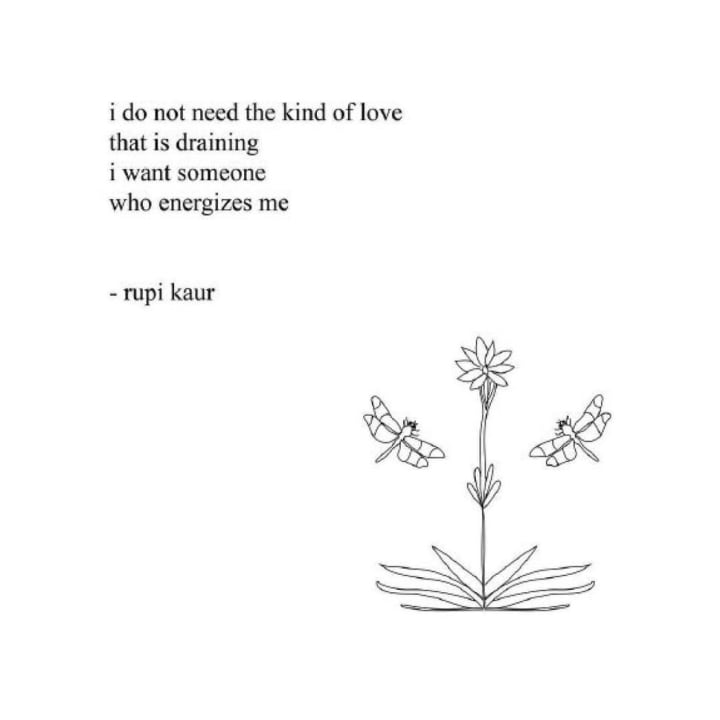
The injustice.
Rating: deep in the negatives
About the Creator
Dalia Yashinsky
Hi, I'm Dalia. A bit about me: 5-year-old, Philosophy Master’s Graduate, Freelance Writer, Lifetime Reader & Aspiring Jeopardy Contestant. I started a thing called DalY Blogs: dalyblogs.com/ (not actually five.)






Comments
There are no comments for this story
Be the first to respond and start the conversation.